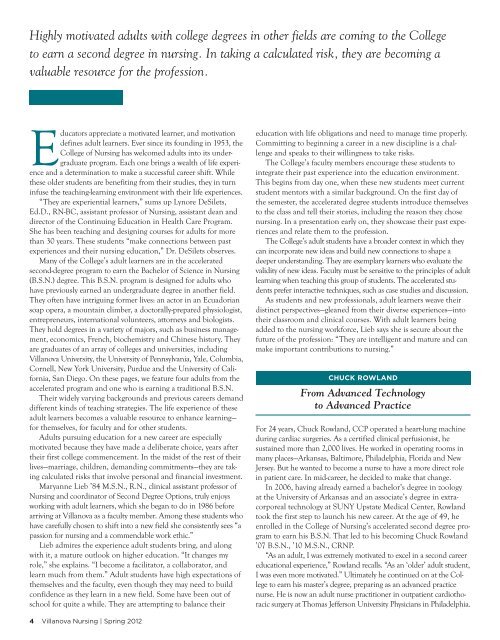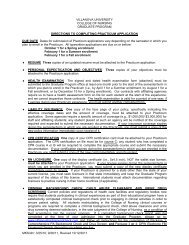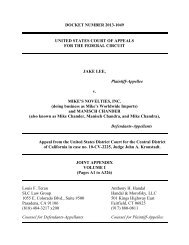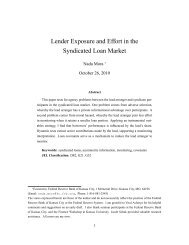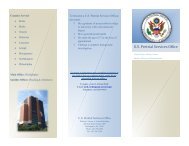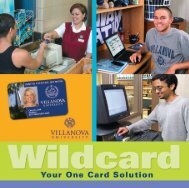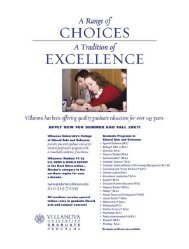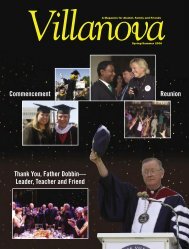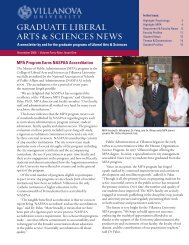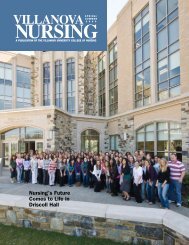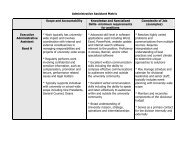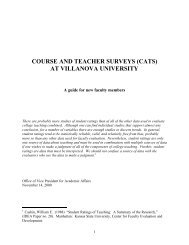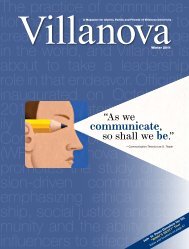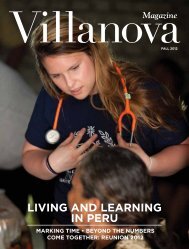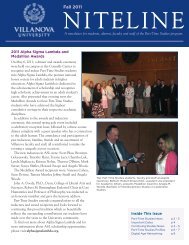ADULT LEARNERS - Villanova University
ADULT LEARNERS - Villanova University
ADULT LEARNERS - Villanova University
Create successful ePaper yourself
Turn your PDF publications into a flip-book with our unique Google optimized e-Paper software.
Highly motivated adults with college degrees in other fields are coming to the Collegeto earn a second degree in nursing. In taking a calculated risk, they are becoming avaluable resource for the profession.Educators appreciate a motivated learner, and motivationdefines adult learners. Ever since its founding in 1953, theCollege of Nursing has welcomed adults into its undergraduateprogram. Each one brings a wealth of life experienceand a determination to make a successful career shift. Whilethese older students are benefiting from their studies, they in turninfuse the teaching-learning environment with their life experiences.“They are experiential learners,” sums up Lynore DeSilets,Ed.D., RN-BC, assistant professor of Nursing, assistant dean anddirector of the Continuing Education in Health Care Program.She has been teaching and designing courses for adults for morethan 30 years. These students “make connections between pastexperiences and their nursing education,” Dr. DeSilets observes.Many of the College’s adult learners are in the acceleratedsecond-degree program to earn the Bachelor of Science in Nursing(B.S.N.) degree. This B.S.N. program is designed for adults whohave previously earned an undergraduate degree in another field.They often have intriguing former lives: an actor in an Ecuadoriansoap opera, a mountain climber, a doctorally-prepared physiologist,entrepreneurs, international volunteers, attorneys and biologists.They hold degrees in a variety of majors, such as business management,economics, French, biochemistry and Chinese history. Theyare graduates of an array of colleges and universities, including<strong>Villanova</strong> <strong>University</strong>, the <strong>University</strong> of Pennsylvania, Yale, Columbia,Cornell, New York <strong>University</strong>, Purdue and the <strong>University</strong> of California,San Diego. On these pages, we feature four adults from theaccelerated program and one who is earning a traditional B.S.N.Their widely varying backgrounds and previous careers demanddifferent kinds of teaching strategies. The life experience of theseadult learners becomes a valuable resource to enhance learning—for themselves, for faculty and for other students.Adults pursuing education for a new career are especiallymotivated because they have made a deliberate choice, years aftertheir first college commencement. In the midst of the rest of theirlives—marriage, children, demanding commitments—they are takingcalculated risks that involve personal and financial investment.Maryanne Lieb ’84 M.S.N., R.N., clinical assistant professor ofNursing and coordinator of Second Degree Options, truly enjoysworking with adult learners, which she began to do in 1986 beforearriving at <strong>Villanova</strong> as a faculty member. Among these students whohave carefully chosen to shift into a new field she consistently sees “apassion for nursing and a commendable work ethic.”Lieb admires the experience adult students bring, and alongwith it, a mature outlook on higher education. “It changes myrole,” she explains. “I become a facilitator, a collaborator, andlearn much from them.” Adult students have high expectations ofthemselves and the faculty, even though they may need to buildconfidence as they learn in a new field. Some have been out ofschool for quite a while. They are attempting to balance theireducation with life obligations and need to manage time properly.Committing to beginning a career in a new discipline is a challengeand speaks to their willingness to take risks.The College’s faculty members encourage these students tointegrate their past experience into the education environment.This begins from day one, when these new students meet currentstudent mentors with a similar background. On the first day ofthe semester, the accelerated degree students introduce themselvesto the class and tell their stories, including the reason they chosenursing. In a presentation early on, they showcase their past experiencesand relate them to the profession.The College’s adult students have a broader context in which theycan incorporate new ideas and build new connections to shape adeeper understanding. They are exemplary learners who evaluate thevalidity of new ideas. Faculty must be sensitive to the principles of adultlearning when teaching this group of students. The accelerated studentsprefer interactive techniques, such as case studies and discussion.As students and new professionals, adult learners weave theirdistinct perspectives—gleaned from their diverse experiences—intotheir classroom and clinical courses. With adult learners beingadded to the nursing workforce, Lieb says she is secure about thefuture of the profession: “They are intelligent and mature and canmake important contributions to nursing.”CHUCK ROWLANDFrom Advanced Technologyto Advanced PracticeFor 24 years, Chuck Rowland, CCP operated a heart-lung machineduring cardiac surgeries. As a certified clinical perfusionist, hesustained more than 2,000 lives. He worked in operating rooms inmany places—Arkansas, Baltimore, Philadelphia, Florida and NewJersey. But he wanted to become a nurse to have a more direct rolein patient care. In mid-career, he decided to make that change.In 2006, having already earned a bachelor’s degree in zoologyat the <strong>University</strong> of Arkansas and an associate’s degree in extracorporealtechnology at SUNY Upstate Medical Center, Rowlandtook the first step to launch his new career. At the age of 49, heenrolled in the College of Nursing’s accelerated second degree programto earn his B.S.N. That led to his becoming Chuck Rowland’07 B.S.N., ’10 M.S.N., CRNP.“As an adult, I was extremely motivated to excel in a second careereducational experience,” Rowland recalls. “As an ‘older’ adult student,I was even more motivated.” Ultimately he continued on at the Collegeto earn his master’s degree, preparing as an advanced practicenurse. He is now an adult nurse practitioner in outpatient cardiothoracicsurgery at Thomas Jefferson <strong>University</strong> Physicians in Philadelphia.4 <strong>Villanova</strong> Nursing | Spring 2012


